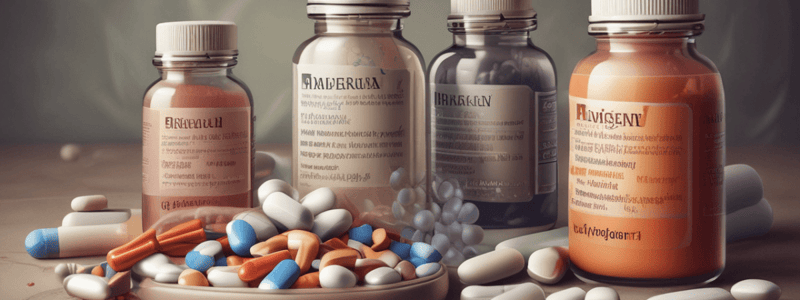Podcast
Questions and Answers
What is the primary outcome of COX-1 and COX-2 inhibition by First Generation NSAIDs?
What is the primary outcome of COX-1 and COX-2 inhibition by First Generation NSAIDs?
- Reduced pain and fever (correct)
- Prostaglandin synthesis
- Enhanced bronchospasm
- Increased platelet aggregation
Which of the following adverse effects is NOT associated with Propionic Acid Derivatives?
Which of the following adverse effects is NOT associated with Propionic Acid Derivatives?
- Gingival hyperplasia
- Hepatotoxicity
- Myocardial damage (correct)
- Hemoptysis
What is the primary mechanism of action of acetaminophen?
What is the primary mechanism of action of acetaminophen?
- Inhibition of COX-1 and COX-2
- Inhibition of prostaglandin synthesis
- Stimulation of platelet aggregation
- Relief of pain and fever (correct)
Which of the following NSAIDs is classified as a Second Generation NSAID?
Which of the following NSAIDs is classified as a Second Generation NSAID?
What is the primary advantage of Second Generation NSAIDs over First Generation NSAIDs?
What is the primary advantage of Second Generation NSAIDs over First Generation NSAIDs?
Which of the following medications is classified as a Propionic Acid Derivative NSAID?
Which of the following medications is classified as a Propionic Acid Derivative NSAID?
What is the primary mechanism of action of acetaminophen in relieving pain and fever?
What is the primary mechanism of action of acetaminophen in relieving pain and fever?
Which of the following is a contraindication for aspirin use?
Which of the following is a contraindication for aspirin use?
What is the primary therapeutic use of aspirin in low doses?
What is the primary therapeutic use of aspirin in low doses?
Which of the following medications is considered safer for individuals with sensitive stomachs?
Which of the following medications is considered safer for individuals with sensitive stomachs?
What is the primary adverse effect of acetaminophen overdose?
What is the primary adverse effect of acetaminophen overdose?
What is the primary mechanism of action of NSAIDs in reducing inflammation?
What is the primary mechanism of action of NSAIDs in reducing inflammation?
What is a common adverse effect of NSAIDs, particularly in the stomach?
What is a common adverse effect of NSAIDs, particularly in the stomach?
Which of the following is NOT a characteristic of third-generation H1 receptor antagonists?
Which of the following is NOT a characteristic of third-generation H1 receptor antagonists?
What is the primary indication for acetaminophen?
What is the primary indication for acetaminophen?
Which enzyme is responsible for producing prostaglandins, and is inhibited by NSAIDs?
Which enzyme is responsible for producing prostaglandins, and is inhibited by NSAIDs?
What is a potential contraindication for the use of NSAIDs?
What is a potential contraindication for the use of NSAIDs?
Which of the following is a potential therapeutic benefit of COX-2 inhibition in NSAIDs?
Which of the following is a potential therapeutic benefit of COX-2 inhibition in NSAIDs?
What is the primary mechanism by which acetaminophen exerts its analgesic effect?
What is the primary mechanism by which acetaminophen exerts its analgesic effect?
Which of the following is a characteristic of Third Generation H1 Receptor Antagonists?
Which of the following is a characteristic of Third Generation H1 Receptor Antagonists?
What is the primary adverse effect of acetaminophen overdose?
What is the primary adverse effect of acetaminophen overdose?
Which of the following NSAIDs is likely to have the most significant anti-inflammatory effects?
Which of the following NSAIDs is likely to have the most significant anti-inflammatory effects?
Which of the following is a common adverse effect of NSAIDs, particularly in the kidney?
Which of the following is a common adverse effect of NSAIDs, particularly in the kidney?
What is the primary reason why acetaminophen is preferred over aspirin in pediatric patients?
What is the primary reason why acetaminophen is preferred over aspirin in pediatric patients?
Which of the following is a characteristic of ibuprofen that is not shared with acetaminophen?
Which of the following is a characteristic of ibuprofen that is not shared with acetaminophen?
What is the primary mechanism by which aspirin and ibuprofen reduce the risk of myocardial infarction and stroke?
What is the primary mechanism by which aspirin and ibuprofen reduce the risk of myocardial infarction and stroke?
Which of the following is a potential adverse effect of long-term use of NSAIDs?
Which of the following is a potential adverse effect of long-term use of NSAIDs?
What is the primary mechanism by which acetaminophen reduces fever?
What is the primary mechanism by which acetaminophen reduces fever?
Which of the following is a characteristic of aspirin that is not shared with ibuprofen?
Which of the following is a characteristic of aspirin that is not shared with ibuprofen?
What is the primary mechanism of pain relief for propionic acid derivatives, such as ibuprofen?
What is the primary mechanism of pain relief for propionic acid derivatives, such as ibuprofen?
What is the primary concern with high-dose acetaminophen use?
What is the primary concern with high-dose acetaminophen use?
What is the primary advantage of COX-2 inhibitors, such as celecoxib, over non-selective NSAIDs?
What is the primary advantage of COX-2 inhibitors, such as celecoxib, over non-selective NSAIDs?
What is the primary mechanism of anti-inflammatory action for aspirin?
What is the primary mechanism of anti-inflammatory action for aspirin?
What is a potential complication of NSAID use in patients with pre-existing kidney disease?
What is a potential complication of NSAID use in patients with pre-existing kidney disease?
Flashcards are hidden until you start studying
Study Notes
Nonsteroidal Anti-inflammatory Drugs (NSAIDs)
- Inhibit the synthesis of prostaglandins, which respond to the inflammatory response
- COX (cyclooxygenase) enzymes, which produce prostaglandins, are inhibited by NSAIDs
- COX enzymes occur in various areas, including:
- Tissue injury, where they promote inflammation and sensitize to painful stimuli
- Stomach, where they protect gastric mucosa
- Platelets, where they stimulate aggregation
- Blood vessels, where they cause vasodilation
- Kidney, where they maintain renal blood flow
- Brain, where they mediate fever and pain perception
First Generation NSAIDs (inhibit both COX1 and COX2)
- Salicylates:
- Prototype: aspirin
- Relieve pain, antipyretic, and suppress platelet aggregation
- Propionic Acid Derivatives:
- Prototype: ibuprofen
- Inhibit prostaglandin synthesis
- Adverse effects:
- Dry mouth
- Gingival hyperplasia
- Dyspepsia
- Heartburn
- Nausea
- Epigastric pain
- Constipation
- GI ulceration
- Nephrotoxicity
- Elevated BUN and creatinine
- Dyspnea
- Bronchospasm
- Hemoptysis
- Others include naproxen and ketorolac (injectable drug often used for pain)
Non-NSAID
- Prototype: acetaminophen
- Non-narcotic analgesic
- Relieves pain and fever
- Large number of prescription and OTC meds
- Adverse effects:
- Hepatotoxicity
- Renal failure
- Myocardial damage if high doses
Second Generation NSAIDs (inhibit only COX-2)
- Prototype: celecoxib
- Referred to as coxibs
- Expensive
- Seems to be less bleeding, especially initially, but maybe not for long term
- Contraindicated if allergic to sulfonamides, NSAIDs, or aspirin
Studying That Suits You
Use AI to generate personalized quizzes and flashcards to suit your learning preferences.




